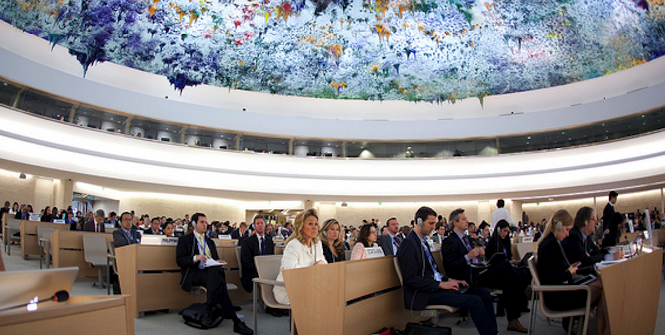Australia’s Human Rights Council Bid Should Start at Home

Australia’s bid for the Human Rights Council has been in the news with the announcement of the Hon Philip Ruddock MP as Australia’s new Special Envoy for Human Rights.
Appointing him on 8 February, Minister for Foreign Affairs Julie Bishop said of the appointment, ‘As a distinguished member of the Australian Parliament for over four decades, the current Chair of the Parliamentary Joint Committee on Human Rights and a longstanding member of Amnesty International, Mr Ruddock is well-qualified to advocate and represent Australia’s human rights views and record’. However the appointment has proven to be a controversial choice: barrister and spokesman for the Australian Lawyers Alliance Greg Barns asserted that it ‘makes as much sense as appointing a cigarette company CEO to champion health’.
Australia’s bid for the UNHRC
The UN Human Rights Council, which replaced the Commission for Human Rights, consists of 47 member states and is divided between five regions. The Council is responsible for the promotion and protection of human rights across the globe. Australia will compete against France and Spain for two seats in the ‘Western Europe and Other’ region for the 2018-2020 term.
Australia’s campaign is built on five pillars: gender equality; good governance; freedom of expression; the rights of indigenous peoples; and strong national human rights institutions and capacity building. Australia aims to build upon these five foundational pillars to ‘advance human rights in practical, sensible ways that will have far-reaching systemic effects over time’. Attorney-General George Brandis has labeled the campaign the ‘most natural thing in the world’ as providing an opportunity for Australia to take a leading role in the international human rights arena.
A positive and significant feature of the campaign is the advocacy for the abolition of the death penalty. There are trends to suggest abolitionist sentiments are spreading, with around 100 abolitionist countries and 140 abolitionist countries in law or practice. To be an effective advocate, the Australian Government will need to be consistent in principle with no ambiguity surrounding its position on the death penalty. The parliamentary inquiry into Australia’s Advocacy for the Abolition of the Death Penalty, led by Philip Ruddock, is currently reviewing how Australia can best promote abolition internationally.
Australia’s human rights record
The challenge for the campaign – as it is for all countries that nominate as candidates – is scrutiny of Australia’s own domestic human rights policies. For example, at the 25th Session of the UN Human Rights Council the Human Rights Law Centre made a statement on human rights violations against Sri Lankan refugees and called on the Council to hold Australia to the highest possible standards as a candidate for 2018.
The UNHRC’s Universal Periodic Review (UPR) is conducted every four and a half years and acts as a peer review process for the international community. Countries review one another’s human rights policies and objectives and make recommendations for priority actions.
From Australia’s 2011 UPR, where the majority of recommendations were accepted, the Australian Human Right Commission (AHRC) reports that only 10 percent of these were actually fulfilled in the designated time period. Furthermore the AHRC, whilst acknowledging the increased use of community arrangements for asylum seekers in Australia, recommends the immediate termination of offshore processing arrangements and instead negotiating through the Bali Process Regional Cooperation Framework.
Other recommendations included the ratification of the Optional Protocol to Convention against Torture and other Cruel, Inhuman or Degrading Treatment or Punishment (OPCAT) and implementation of a National Preventative Mechanism (NPM) to strengthen the rights of people in detention. A letter from a group of human rights civil society organisations addressed to Attorney-General Brandis explains that ‘delayed implementation of a NPM would render Australia’s ratification of OPCAT symbolic rather than effective, potentially compromising Australia’s stated commitment to human rights’.
Prospects for success
Australia’s candidacy for the UN Human Rights Council 2018-2020 is rated by observers as competitive. However both France and Spain will likely have strong backing from the EU for their Council bids. Australia’s advantage is its proximity and relationship with the Asia-Pacific.
Contentions that the implementation of some of Australia’s human rights policies do not meet international human rights norms must be addressed. If Australia wishes to be taken seriously by its international peers it must walk with integrity by promoting human rights at home and abroad.
Attorney-General George Brandis asserts that Australia is ‘a nation built on a belief in, and a commitment to, the human rights of all – the human rights of all Australians and the human rights of all the peoples of the world’. This is a statement that Australia should take seriously. Australia should continue to pursue its ambitious human rights agenda, first by improving its human rights pillars in order to be competitive for the UN Human Rights Council in 2018.
Jes’Se Rushby is currently studying a Bachelor of International Studies/Bachelor of Communication in Media at the University of Canberra. She is also a former intern at the AIIA. This article may be republished under a Creative Commons Licence.


